

Newly discovered effects of vitamin D on cancer - ScienceBlog.com. A team of researchers at McGill University have discovered a molecular basis for the potential cancer preventive effects of vitamin D.
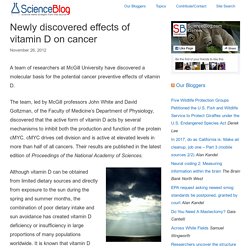
The team, led by McGill professors John White and David Goltzman, of the Faculty of Medicine’s Department of Physiology, discovered that the active form of vitamin D acts by several mechanisms to inhibit both the production and function of the protein cMYC. cMYC drives cell division and is active at elevated levels in more than half of all cancers. Their results are published in the latest edition of Proceedings of the National Academy of Sciences. Although vitamin D can be obtained from limited dietary sources and directly from exposure to the sun during the spring and summer months, the combination of poor dietary intake and sun avoidance has created vitamin D deficiency or insufficiency in large proportions of many populations worldwide.
CancerPEO CAMB. Pet Natural Cancer Cures: How Much Whey Protein for Animal Size? Chart and Guide. There is a glutathione pet natural cancer cures connection.
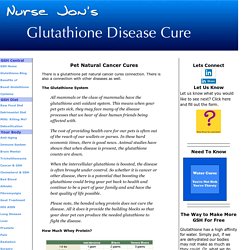
There is also a connection with other diseases as well. The Glutathione System All mammals or the class of mammalia have the glutathione anti oxidant system. This means when your pet gets sick, they may face many of the disease processes that we hear of dear human friends being affected with. The cost of providing health care for our pets is often out of the reach of our wallets or purses. How Much Whey Protein? But What About... As with humans, cancer in animals has a peculiar action. Glutathione Regulation in Pets. Chemotherapy - Cancer Cells, Oncologists - Life Extension Health Concern. Cancer cells are everything we would like healthy cells to be: They quickly adapt to toxic environments, they readily alter themselves to assure their continued survival, and they utilize biologic mechanisms to promote cellular immortality.
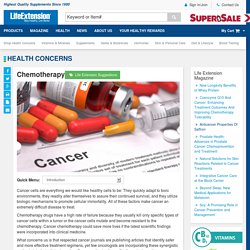
All of these factors make cancer an extremely difficult disease to treat. Chemotherapy drugs have a high rate of failure because they usually kill only specific types of cancer cells within a tumor or the cancer cells mutate and become resistant to the chemotherapy. Cancer chemotherapy could save more lives if the latest scientific findings were incorporated into clinical medicine. What concerns us is that respected cancer journals are publishing articles that identify safer and more effective treatment regimens, yet few oncologists are incorporating these synergistic methods into their clinical practice. Cancer patients often suffer through chemotherapy sessions that do not integrate the latest scientific findings.
Whey Protein & Cancer - Dog Cancer Treatment Australia. Whey Protein Notes from Researchers.
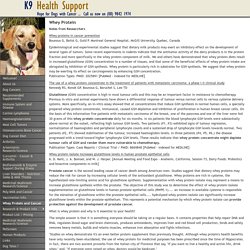
The.Prime.Cause.Full.Presentation.2012 1. VitDstudyforveterinariansICCI website. Iast12i1p13. Indian Journal of Medical and Paediatric Oncology, Vol. 33, No. 1, January-March, 2012, pp. 13-20 Review Article Glutamine: A novel approach to chemotherapy-induced toxicity.
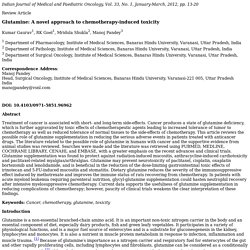
Prostate%20Research. Amino acids in CANCER treatment and prevention. Hearing a diagnosis of cancer from a doctor is always a shock, but thanks to advances in science and medicine, such a condition is no longer always fatal.
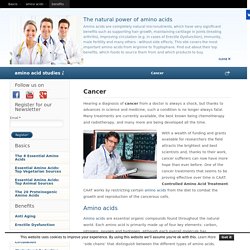
Many treatments are currently available, the best known being chemotherapy and radiotherapy, and many more are being developed all the time. With a wealth of funding and grants available for researchers the field attracts the brightest and best scientists and, thanks to their work, cancer sufferers can now have more hope than ever before. One of the cancer treatments that seems to be proving effective over time is CAAT: Controlled Amino Acid Treatment. CAAT works by restricting certain amino acids from the diet to combat the growth and reproduction of the cancerous cells. Amino acids Amino acids are essential organic compounds found throughout the natural world. There are 20 standard amino acids (as well as many non-standard ones) of which 9 or 10 are considered to be ‘essential amino acids.’ Benefits and Usage of CAAT Starving the Tumor.
L-Arginine & Cancer. On December 15, 1991 the LA Times published a large expose about Jimmy Keller, a man dedicated to healing and experimental medicine.
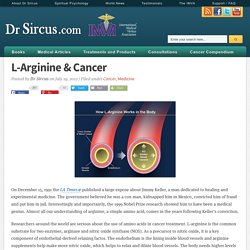
The government believed he was a con man, kidnapped him in Mexico, convicted him of fraud and put him in jail. Interestingly and importantly, the 1999 Nobel Prize research showed him to have been a medical genius. Almost all our understanding of arginine, a simple amino acid, comes in the years following Keller’s conviction. Researchers around the world are serious about the use of amino acids in cancer treatment.
L-arginine is the common substrate for two enzymes, arginase and nitric oxide synthase (NOS). Dr. Arginine is used to treat conditions that improve with increased blood flow, such as chest pains, erectile dysfunction, clogged arteries, vascular disease and headaches, according to the Mayo Clinic.Arginine is one of the 20 most common natural amino acids and this is what Keller was injecting intelligently into his cancer patients’ veins. Intravenous Vitamin C Administration Improves Quality of Life in Breast Cancer Patients during Chemo-/Radiotherapy and Aftercare: Results of a Retrospective, Multicentre, Epidemiological Cohort Study in Germany.
+ Author Affiliations Correspondence to: Professor Dr. med Josef Beuth, Institute for Naturopathy, University of Cologne, Joseph-Stelzmann-Str. 9/Building 35a, D-50931 Cologne, Germany.
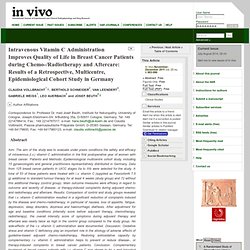
Diet and Cancer: The Disconnect Between Epidemiology and Randomized Clinical Trials. + Author Affiliations Requests for reprints: Frank L.

Untitled. Cancer: A Collagen Disease, Secondary to a Nutritional Deficiency? By W.J.
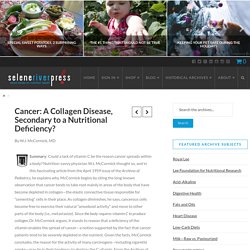
McCormick, MD Summary: Could a lack of vitamin C be the reason cancer spreads within a body? Nutrition-savvy physician W.J. McCormick thought so, and in this fascinating article from the April 1959 issue of the Archives of Pediatrics, he explains why. McCormick begins by citing the long-known observation that cancer tends to take root mainly in areas of the body that have become depleted in collagen—the elastic connective tissue responsible for “cementing” cells in their place. [The following is a transcription of the original Archives document. VitDstudyforveterinariansICCI website. A Cancer Root Cause - Deficiency Of Four Nutrients.